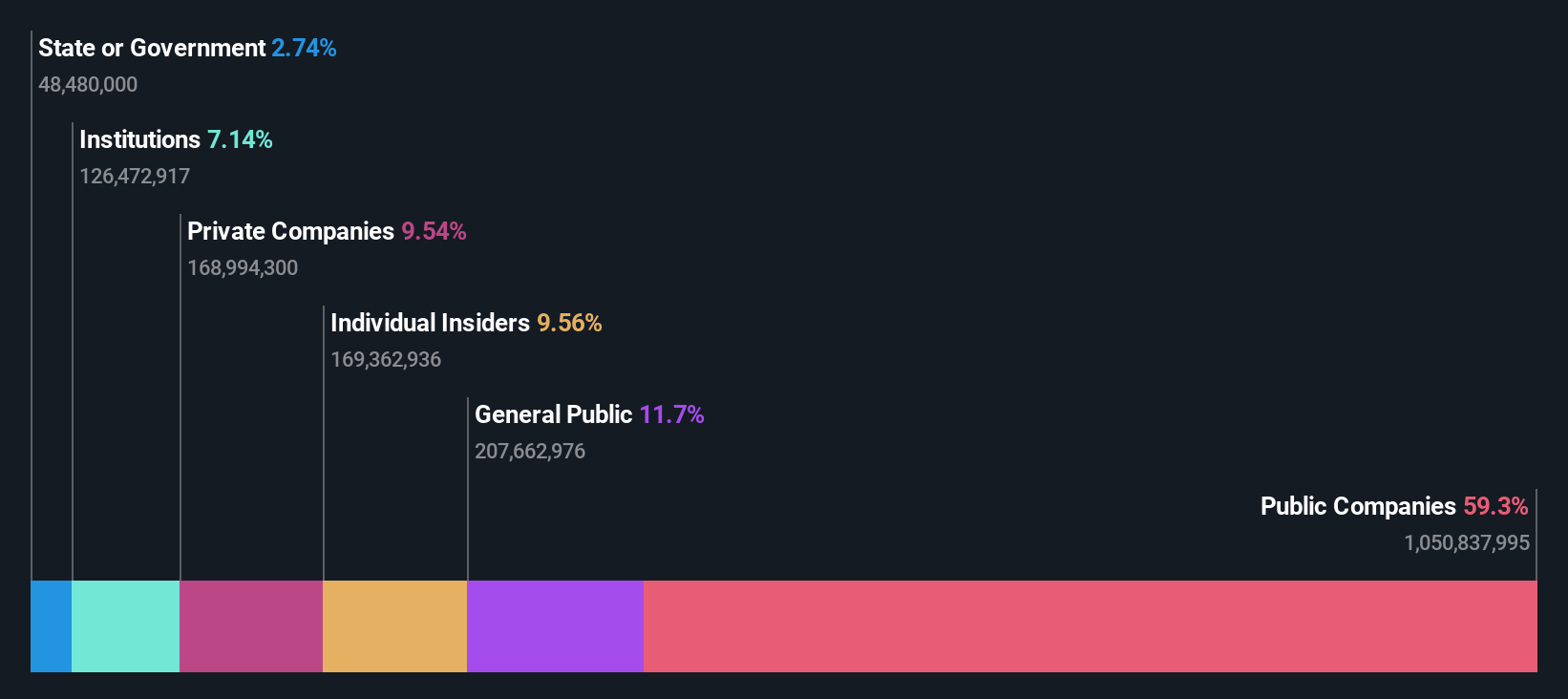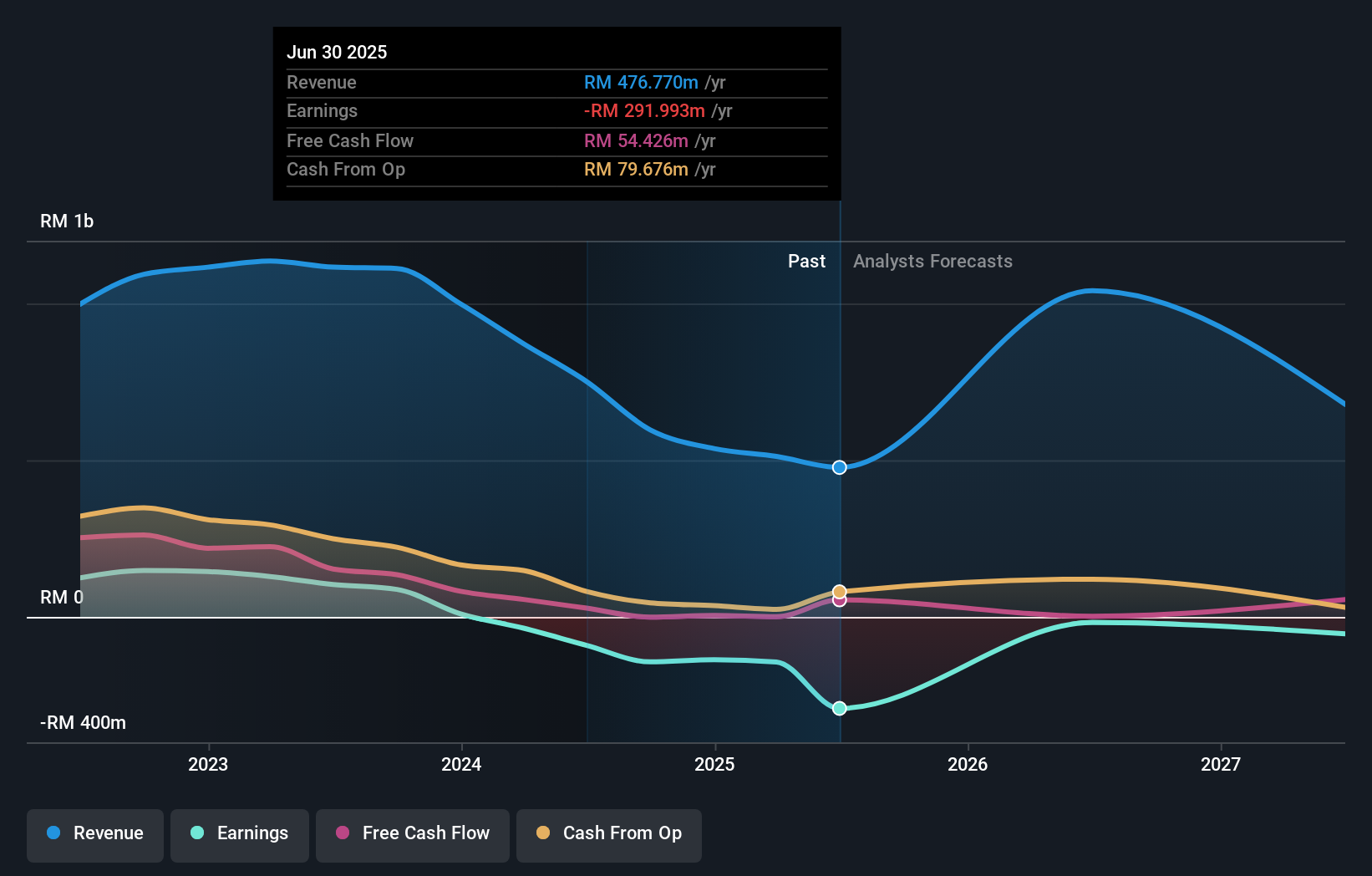- Malaysia
- /
- Hospitality
- /
- KLSE:BJFOOD
Public companies are Berjaya Food Berhad's (KLSE:BJFOOD) biggest owners and were hit after market cap dropped RM62m
Key Insights
- Significant control over Berjaya Food Berhad by public companies implies that the general public has more power to influence management and governance-related decisions
- 57% of the company is held by a single shareholder (Berjaya Corporation Berhad)
- Ownership research, combined with past performance data can help provide a good understanding of opportunities in a stock
A look at the shareholders of Berjaya Food Berhad (KLSE:BJFOOD) can tell us which group is most powerful. And the group that holds the biggest piece of the pie are public companies with 59% ownership. In other words, the group stands to gain the most (or lose the most) from their investment into the company.
And last week, public companies endured the biggest losses as the stock fell by 12%.
Let's delve deeper into each type of owner of Berjaya Food Berhad, beginning with the chart below.
View our latest analysis for Berjaya Food Berhad

What Does The Institutional Ownership Tell Us About Berjaya Food Berhad?
Institutional investors commonly compare their own returns to the returns of a commonly followed index. So they generally do consider buying larger companies that are included in the relevant benchmark index.
We can see that Berjaya Food Berhad does have institutional investors; and they hold a good portion of the company's stock. This implies the analysts working for those institutions have looked at the stock and they like it. But just like anyone else, they could be wrong. It is not uncommon to see a big share price drop if two large institutional investors try to sell out of a stock at the same time. So it is worth checking the past earnings trajectory of Berjaya Food Berhad, (below). Of course, keep in mind that there are other factors to consider, too.

Berjaya Food Berhad is not owned by hedge funds. Berjaya Corporation Berhad is currently the company's largest shareholder with 57% of shares outstanding. This essentially means that they have extensive influence, if not outright control, over the future of the corporation. In comparison, the second and third largest shareholders hold about 5.4% and 4.9% of the stock.
While studying institutional ownership for a company can add value to your research, it is also a good practice to research analyst recommendations to get a deeper understand of a stock's expected performance. There is a little analyst coverage of the stock, but not much. So there is room for it to gain more coverage.
Insider Ownership Of Berjaya Food Berhad
The definition of an insider can differ slightly between different countries, but members of the board of directors always count. Company management run the business, but the CEO will answer to the board, even if he or she is a member of it.
I generally consider insider ownership to be a good thing. However, on some occasions it makes it more difficult for other shareholders to hold the board accountable for decisions.
Shareholders would probably be interested to learn that insiders own shares in Berjaya Food Berhad. It has a market capitalization of just RM470m, and insiders have RM45m worth of shares, in their own names. Some would say this shows alignment of interests between shareholders and the board, though we generally prefer to see bigger insider holdings. But it might be worth checking if those insiders have been selling.
General Public Ownership
With a 12% ownership, the general public, mostly comprising of individual investors, have some degree of sway over Berjaya Food Berhad. While this size of ownership may not be enough to sway a policy decision in their favour, they can still make a collective impact on company policies.
Private Company Ownership
Our data indicates that Private Companies hold 9.5%, of the company's shares. It might be worth looking deeper into this. If related parties, such as insiders, have an interest in one of these private companies, that should be disclosed in the annual report. Private companies may also have a strategic interest in the company.
Public Company Ownership
Public companies currently own 59% of Berjaya Food Berhad stock. This may be a strategic interest and the two companies may have related business interests. It could be that they have de-merged. This holding is probably worth investigating further.
Next Steps:
I find it very interesting to look at who exactly owns a company. But to truly gain insight, we need to consider other information, too. For example, we've discovered 2 warning signs for Berjaya Food Berhad that you should be aware of before investing here.
If you are like me, you may want to think about whether this company will grow or shrink. Luckily, you can check this free report showing analyst forecasts for its future.
NB: Figures in this article are calculated using data from the last twelve months, which refer to the 12-month period ending on the last date of the month the financial statement is dated. This may not be consistent with full year annual report figures.
Valuation is complex, but we're here to simplify it.
Discover if Berjaya Food Berhad might be undervalued or overvalued with our detailed analysis, featuring fair value estimates, potential risks, dividends, insider trades, and its financial condition.
Access Free AnalysisHave feedback on this article? Concerned about the content? Get in touch with us directly. Alternatively, email editorial-team (at) simplywallst.com.
This article by Simply Wall St is general in nature. We provide commentary based on historical data and analyst forecasts only using an unbiased methodology and our articles are not intended to be financial advice. It does not constitute a recommendation to buy or sell any stock, and does not take account of your objectives, or your financial situation. We aim to bring you long-term focused analysis driven by fundamental data. Note that our analysis may not factor in the latest price-sensitive company announcements or qualitative material. Simply Wall St has no position in any stocks mentioned.
About KLSE:BJFOOD
Berjaya Food Berhad
An investment holding company, develops and operates restaurants, café chains, and retail outlets in Malaysia and other Southeast Asian countries.
Good value with very low risk.
Market Insights
Community Narratives



